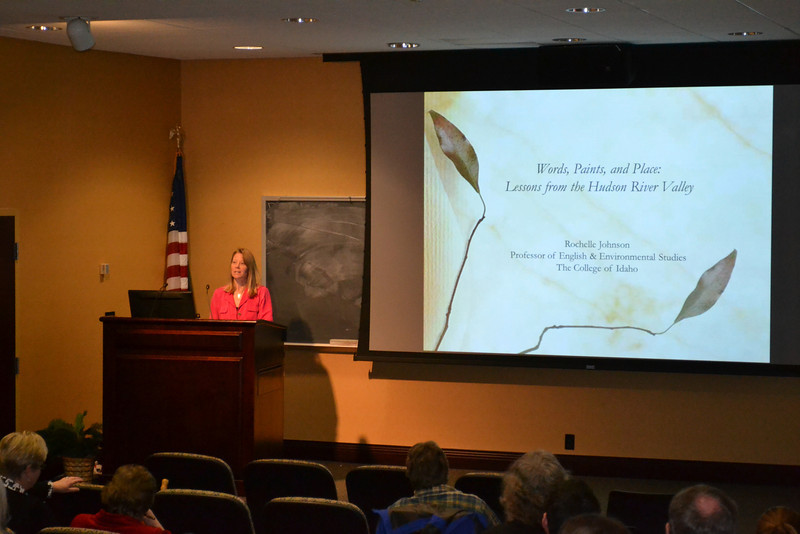Dr. Rochelle Johnson Stresses Environment Consciousness
April 11, 2014
Dr. Rochelle Johnson, professor of English and Environmental Studies at the College of Idaho, said that we need to connect more with the environment in order to learn about our existence. Her two separate discussion-based talks took place on April 7.
The talks, entitled “On Biography and the Susquehanna: Susan Fenimore Cooper’s Place” and “Words, Paints, and Place: Lessons from the Hudson River Valley” dealt with ideas of environmental consciousness in our lives.
Johnson’s talks mainly discussed the 19th-century American writer and naturalist Susan Fenimore Cooper. As the daughter of James Fenimore Cooper, author of “The Last of the Mohicans,” many argued that he inspired her attention to nature’s particulars.
Johnson was able to visit Cooperstown, N.Y., specifically Otsego Lake, the southern shore of which is the source of the Susquehanna River. She wanted to immerse herself in the nature that Cooper so often wrote about in great detail.
“[Cooper] had a sense of living in a celebrated space,” Johnson said.
On her tour of the town, Johnson visited what used to be the Cooper family home. There, she found many of Cooper’s papers, often looked over by historians or biographical writers who were more interested in her father. Cooper’s papers revealed much about her personal life, which Johnson stressed speak to a writer’s style, mindset, and ideas.
Johnson said how Cooper’s entire body of writing dealt with how she sadly saw a rift between human community and natural community. Cooper wanted to make the world more observant and aware of the environment. Johnson explained how Cooper had an idealized version of what America should be, and wanted to improve society in a large way. Cooper inspired famous scientists such as Charles Darwin, who wrote to Asa Gray (one of the most important American botanists at the time) asking about Cooper and her knowledge about the natural environment. She informed them much about concepts such as plant succession and endemics, which no one at the time gave much thought to.
Anna Gioni ’14 got a chance to visit Cooperstown and was eager to learn more about her from the discussion with Johnson.
“Rochelle provided us with insight into her process as a literary biographer, which sounded to me like a role similar to that of a detective. I was fascinated to hear about her discovery of a trunk in the Cooper family home that had never before been opened, and the countless letters and manuscripts written by Susan she found inside of it. I can only imagine how exciting that would have been for her, especially because previous biographers had told her that there was very little in the house pertaining to Susan,” Gioni said.
Johnson’s interest in Cooper arose in graduate school when she began to look at Cooper’s contemporary, Henry David Thoreau. Johnson began to wonder whether or not Thoreau’s greater level of fame was connected to his gender. She was interested in Cooper as a female when writing about scientific topics, and that’s when her research began.






















